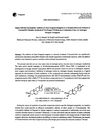 19 citations,
January 2008 in “The veterinary clinics of North America. Exotic animal practice”
19 citations,
January 2008 in “The veterinary clinics of North America. Exotic animal practice” Adrenal gland disease is common in ferrets and causes hair loss and other symptoms.
[object Object]  17 citations,
December 2020 in “Journal of Genetic Counseling”
17 citations,
December 2020 in “Journal of Genetic Counseling” Genetic counselors should be culturally skilled and aware of transgender patients' unique health risks and needs.
 15 citations,
May 2004 in “Facial Plastic Surgery Clinics of North America”
15 citations,
May 2004 in “Facial Plastic Surgery Clinics of North America” Treat pattern hair loss with finasteride and topical minoxidil.
 7 citations,
January 2019 in “Headache”
7 citations,
January 2019 in “Headache” Hormone therapy may increase migraines in transgender women and decrease them in transgender men; more research is needed on migraine management in transgender individuals.
 5 citations,
September 2012 in “Springer eBooks”
5 citations,
September 2012 in “Springer eBooks” Nanoparticles can be used to deliver drugs to hair follicles, potentially improving treatments for conditions like acne and alopecia, and could also be used for vaccine delivery and gene therapy.
 December 2024 in “Pharmaceutics”
December 2024 in “Pharmaceutics” Spironolactone nano-formulations show promise for treating skin disorders, but more research is needed for safety and effectiveness.
514 citations,
February 2011 in “International journal of women's health” Different treatments for PCOS focus on the specific symptoms, with weight loss and lifestyle changes being important.
 1 citations,
April 2022 in “Emergency Medicine Australasia”
1 citations,
April 2022 in “Emergency Medicine Australasia” The document concludes that respectful, gender-affirming healthcare improves mental health and encourages continued medical care for transgender and non-binary individuals.
20 citations,
December 1994 in “Fertility and sterility” Flutamide combined with a low-dose birth control pill effectively reduces excessive hair growth in women with polycystic ovarian disease.
 10 citations,
August 2022 in “Journal of clinical sleep medicine”
10 citations,
August 2022 in “Journal of clinical sleep medicine” Transgender youth have more sleep disorders, but gender-affirming therapy may help reduce them.
 5 citations,
September 2021 in “Southern African Journal of Hiv Medicine”
5 citations,
September 2021 in “Southern African Journal of Hiv Medicine” The guideline provides healthcare professionals in South Africa with instructions for comprehensive, multidisciplinary gender-affirming care, including HIV prevention and treatment for transgender and gender diverse individuals.
[object Object]  1 citations,
January 1997 in “Journal of Investigative Dermatology”
1 citations,
January 1997 in “Journal of Investigative Dermatology” RU58841, an androgen receptor blocker, significantly increased hair density, thickness, and length in monkeys when applied topically daily for several months.
 March 1998 in “Journal of Dermatological Science”
March 1998 in “Journal of Dermatological Science” Combining RU58841 and minoxidil significantly increases hair growth.
 233 citations,
November 2002 in “The journal of investigative dermatology/Journal of investigative dermatology”
233 citations,
November 2002 in “The journal of investigative dermatology/Journal of investigative dermatology” Creating stronger blockers for skin enzymes might lead to better treatment for conditions like acne and excessive hair growth.
 33 citations,
January 1997 in “Endocrinology”
33 citations,
January 1997 in “Endocrinology” Testosterone can slow down hair growth when combined with certain cells from bald scalps, and this effect can be blocked by an androgen receptor blocker.
 9 citations,
January 1997 in “Gynecological Endocrinology”
9 citations,
January 1997 in “Gynecological Endocrinology” The document concludes that treating androgen excess needs patience, managing expectations is important, and many drugs used are not officially approved, suggesting cosmetic options for mild cases.
1 citations,
June 2022 in “Frontiers in Neuroanatomy” Early hormones shape sex-specific differences in rat glands.
 204 citations,
February 2000 in “Current Medicinal Chemistry”
204 citations,
February 2000 in “Current Medicinal Chemistry” Antiandrogens like flutamide are effective in treating conditions like prostate cancer and hair loss, but there's a need for more potent versions. Understanding their structure can help develop better treatments.

research Acne
81 citations,
January 2002 in “American journal of clinical dermatology” Hormonal treatments can help with acne, especially in women, by lowering androgen levels or blocking their effects.
 19 citations,
January 1997 in “Endocrinology”
19 citations,
January 1997 in “Endocrinology” Testosterone can slow hair growth in adult monkeys, but a blocker called RU 58841 can counteract this and potentially help hair regrow.
 14 citations,
February 1994 in “Tetrahedron Letters”
14 citations,
February 1994 in “Tetrahedron Letters” Adding cerium(III) chloride to Grignard reagents improves the making of compounds that could treat prostate issues and hair loss.
 11 citations,
March 2009 in “Bioorganic & Medicinal Chemistry Letters”
11 citations,
March 2009 in “Bioorganic & Medicinal Chemistry Letters” Chemicals called 4-(alkylthio)- and 4-(arylthio)-benzonitrile derivatives can potentially reduce oil production on skin, which could help treat conditions like acne and hair loss.
 1 citations,
August 2002 in “Zeitschrift für Hautkrankheiten”
1 citations,
August 2002 in “Zeitschrift für Hautkrankheiten” Male androgenetic alopecia involves hair follicle miniaturization due to DHT, with potential treatments using inhibitors and blockers.
 118 citations,
September 2004 in “Clinics in Dermatology”
118 citations,
September 2004 in “Clinics in Dermatology” Hormones, especially androgens, play a big role in acne, but most acne sufferers don't have a hormone disorder. Hormonal treatments, including birth control pills, can be very effective for women whose acne doesn't improve with regular treatments.
 54 citations,
November 2017 in “Scientific Reports”
54 citations,
November 2017 in “Scientific Reports” The study found that certain microRNAs are higher in the cells and lower in the fluid of women with a specific type of polycystic ovary syndrome, and one microRNA could potentially help diagnose the condition.
 46 citations,
September 2016 in “Clinical, Cosmetic and Investigational Dermatology”
46 citations,
September 2016 in “Clinical, Cosmetic and Investigational Dermatology” Hormonal treatments are effective for severe or persistent acne and should be used with other acne therapies, considering potential side effects.
 26 citations,
October 2016 in “Clinics in Dermatology”
26 citations,
October 2016 in “Clinics in Dermatology” Hormonal treatments can improve acne, but they come with potential side effects and risks.
 24 citations,
January 2013 in “Indian Journal of Dermatology, Venereology and Leprology”
24 citations,
January 2013 in “Indian Journal of Dermatology, Venereology and Leprology” Hormonal treatment is effective for women with acne not helped by usual treatments, especially if they have hormonal imbalances.
 21 citations,
February 2017 in “International Journal of Women's Dermatology”
21 citations,
February 2017 in “International Journal of Women's Dermatology” Hormonal therapies help treat female hair loss, but results are slow and vary.
 3 citations,
September 2021 in “International Journal of Molecular Sciences”
3 citations,
September 2021 in “International Journal of Molecular Sciences” Androgens and a high-fat diet may increase the risk of severe COVID-19 in women with PCOS by upregulating certain proteins in the heart and kidneys.



























